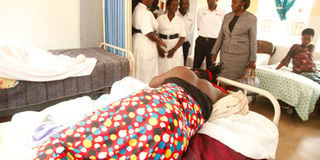Managing sickle cell anaemia

A patient receives treatment at Kawala Health Center IV last month. Stressful situations are among the triggers of attack so they are better avoided. PHOTO BY Rachael Mabala
What you need to know:
- While lifestyle changes will not cure Sickle Cell Disease, taking good care of yourself may reduce the frequency and severity of acute sickle cell crises and prevent other complications.
A sickle cell attack or crisis is a painful episode that occurs when the sickle-shaped red blood cells block the passage of blood in the vessels.
According to Dr Herbert Luyima, a clinical officer at the sickle cell clinic in Mulago, the pain is unbearable irrespective of age. “It starts from a particular area and spreads to the rest of the body. This is because blood and oxygen cannot reach some tissues thus causing pain.”
A sickle cell attack is likely to be triggered by not having enough water in the body (dehydration), not eating enough food, not taking recommended medications, being too cold or too hot, physical exercises that require a lot of energy, emotional stress and anxiety and infection. This is because people living with the disease have low immunity.
Dr Luyima recommends: “Children above one year can take the penicillin tablets every day until they are five years old to prevent bacterial infections. After five years, the immunity is fully developed so there is no need to take the tablets anymore.”
Preventive measures
Immunisation of people living with sickle cell disease with penicillin prophylaxis reduces their risk of developing bacterial infections.
Pneumococcal vaccine (freely available in all hospitals for all children below five years) is commonly used to reduce the symptoms of sickle cell disease. If you carry the sickle cell trait and are already married, it is wise to see a doctor before conceiving. The doctor will help you understand your risk of having a child with sickle cell anemia as well as explain possible treatments, preventive measures and reproductive options.
“Before getting married, a couple should go for sickle cell screening to ensure they do not both have a sickle cell trait. If both partners have sickle cell trait, there are higher chances of giving birth to babies that suffer from sickle cell disease.”
Care in case of an attack
• Whenever a sickler (sickle cell patient) gets an attack, it is advisable for them to drink a lot of fluids to flash out the blocked cells.
• Take painkillers such as Panadol, ibuprofen and dichlrorofenac with Oral Rehydration Solution.
• Keeping warm is also important. Consider a warm bath or massage the area the pain started. This is because when it is cold, veins shrink.
• It is advisable for sicklers to see a doctor to treat the cause of pain if they experience difficulty breathing, chest pain, severe abdominal pain and sudden weakness.
Warding off the crises
Ruth Mukiibi, the head of Sickle Cell Association of Uganda, says people living with sickle cell must eat a balanced diet, drink a lot of fluids and exercise.
“The exercises must not be strenuous. Stretching, brisk walking may help for proper digestion, strong muscles and prevent joint problems,” she says.
Mukiibi says since people living with Sickle Cell must avoid getting too hot or cold, some physical exercises should be avoided.
She also advises people living with the disease to get enough sleep and avoid emotional and physical stress.
Sicklers should also avoid caffeinated drinks such as soda, coffee, alcohol, and energy drinks. The extra caffeine overstimulates the system and one ends up more dehydrated.




